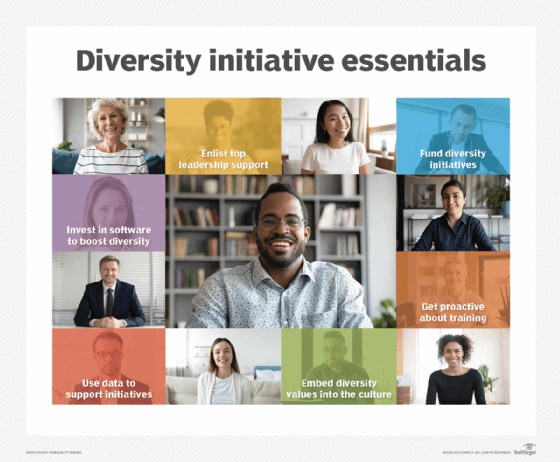diversity, equity and inclusion (DEI)
Diversity, equity and inclusion (DEI) is a term used to describe policies and programs that promote the representation and participation of different groups of individuals, including people of different ages, races and ethnicities, abilities and disabilities, genders, religions, cultures and sexual orientations. This also covers people with diverse backgrounds, experiences, skills and expertise.
What is diversity?
Diversity involves all the ways that people are different, including the different characteristics that make one group or individual different from another. Diversity includes:
- Race and ethnicity
- Sexual orientation
- Socioeconomic status
- Gender identity
- Religion
- Language
- Age
- Marital status
- Veteran status
- Mental ability
- Physical ability
- People with disabilities
Diversity may also include a range of ideas, perspectives and values.
What is equity?
Equity aims to ensure the fair treatment, access, equality of opportunity and advancement for everyone while also attempting to identify and remove the barriers that have prevented some groups from fully participating. Equity promotes justice, fairness and impartiality within the processes, procedures and distribution of resources by systems or institutions. To tackle equity, people need to understand the root causes of outcome disparities in society.
What is inclusion?
Inclusion builds a culture where everyone feels welcome by actively inviting every person or every group to contribute and participate. This inclusive and welcoming environment supports and embraces differences and offers respect to everyone in words and actions. A work environment that's inclusive is supportive, respectful and collaborative and aims to get all employees to participate and contribute. An inclusive work environment endeavors to remove all barriers, discrimination and intolerance.
Why are diversity, equity and inclusion important?
Diversity, equity and inclusion matter because they help build a fair society that allows all people to get equal opportunities. DEI brings together people, perspectives and ideas to help create stronger bonds among individuals and stronger organizations.
The moral case for DEI is that everyone has something of value to contribute and as such society has a responsibility to address barriers and historical factors that have caused unfair conditions for underrepresented groups. For example, from a moral standpoint, because the mission of nonprofit organizations is to improve society, they should be diverse, inclusive and equitable.
Economically, DEI is the idea that companies that seek out diverse candidates and/or engage in diversity training are stronger and operate more efficiently. Without diversity, organizations will most likely lack new perspectives and not be as competitive as other companies that do embrace diversity. Without a culture of equity and inclusion, employees who feel underrepresented are likely to quit, taking their talents with them.

What are the differences between diversity, equity and inclusion?
Although diversity, equity and inclusion are innately connected, they are also separate concepts.
Diversity is acknowledging that people aren't sets of specific characteristics and acknowledging that each voice is unique. Real diversity requires a deeper understanding of each person.
Diversity refers to how diverse a workforce is as it pertains to specific characteristics, including gender, sexuality, culture and experience. At its core, it's about welcoming different perspectives to a business.
Inclusion in an organization, on the other hand, is ensuring that each worker is given the necessary room to flourish and succeed, while diversity is about creating a workforce with a wide variety of backgrounds and experiences.
Inclusion is about giving all employees the opportunity to voice their opinions so they don't feel excluded based on their identities and enabling them to see themselves reflected in their organizations' values.
In the workplace, equity acknowledges that we're all different, and those differences make everyone great. As such, companies that adopt equity practices don't establish one-size-fits-all policies. Rather they take individual needs into consideration, while also readjusting organizational structures to account for the disadvantages minority groups face.
Roles of diversity, equity and inclusion in organizations and how to address them
Companies with DEI policies are more creative and innovative as employees with different experiences, backgrounds and skills bring more to the table than nondiverse workers, which can have a positive effect on the organizations' bottom lines. In addition, employees who work at companies that have strong DEI programs are happier in their jobs, trust management more and perform better.
For DEI initiatives to be successful, workers must understand that everyone is responsible for building an inclusive corporate culture. That means implementing top-down companywide strategies and programs to address and prevent workplace bias and promote inclusivity, recognition, respect and appreciation.
Here are some ways to approach implementing DEI in the workplace:
- Bring a chief diversity officer (CDO) on board who is responsible for building strategies to attract and retain diverse employees, improving the culture of the organization, supporting employee resource groups and creating a more inclusive work environment.
- Select a transformation committee comprising team members who are passionate about building a more diverse, equitable and inclusive organization. This committee will work with the CDO and other leaders to develop action plans to meet the organization's DEI strategy.
- Identify workers who want to act as DEI sponsors. Newer and/or younger workers are often eager to help with DEI initiatives. Strike a balance between senior and junior workers who can help encourage a culture of diversity, equity and inclusion within the company.
- Talk to employees about why DEI matters in the organization. Companies need diverse leaders who emphasize the need for DEI in the workplace.
- Ensure DEI is integrated into the larger business strategy and culture of the organization, including human resources.
- Develop sponsorship programs to provide opportunity and growth to minority or marginalized groups.
- Company management should ensure that the DEI goals are concrete, actionable and quantifiable.
- Communicate expectations and hold management accountable for results. Employees have clear expectations about the organization's DEI initiatives and senior leaders must communicate those expectations throughout the organization and participate in making the program successful in their teams.
- Commission an annual DEI report listing the DEI work the company has been doing and the progress made toward meeting its goals and objectives. In addition, track data on team diversity, recruiting process and retention.







